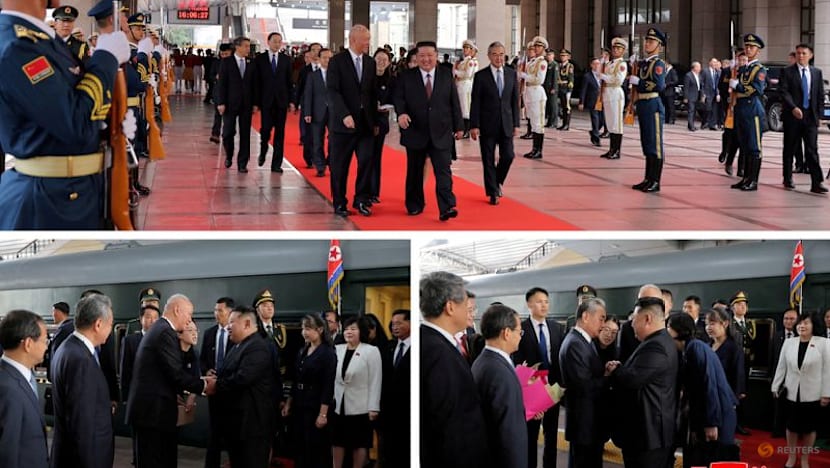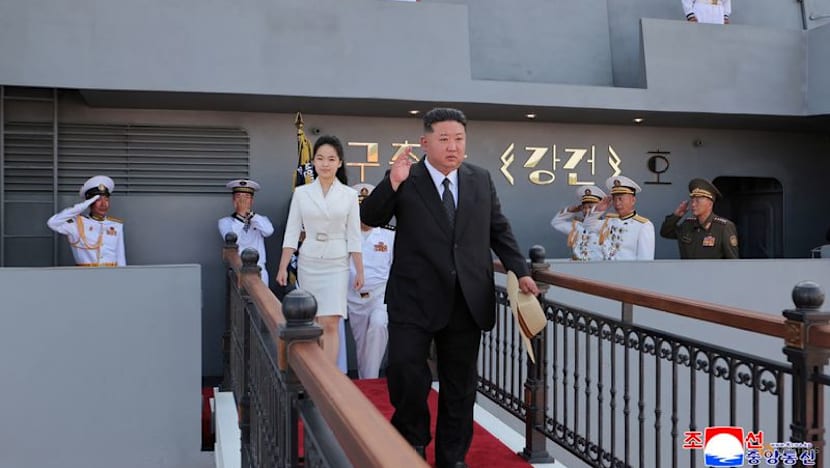Commentary: North Korea’s Kim may have just paraded his successor to the world in Beijing
The presence of Kim Jong Un’s daughter at a massive military parade in Beijing last week suggests a deliberate effort to raise her public profile, says Pusan National University’s Robert Kelly.

North Korean leader Kim Jong Un and his daughter Kim Ju Ae are greeted by Director of the General Office of the Chinese Communist Party (CCP) Cai Qi (bottom left) and Chinese Foreign Minister Wang Yi (bottom right) after arriving in Beijing, China, on Sep 2, 2025. (Photo: KCNA via Reuters)

This audio is generated by an AI tool.
BUSAN: Chinese President Xi Jinping invited world leaders to a massive military parade in Beijing last week to commemorate the 80th anniversary of the end of World War II.
Most notable was the attendance of both Russian President Vladimir Putin and North Korean leader Kim Jong Un. These three leaders have never appeared together before, and their joint showing suggests China, Russia and North Korea’s growing alignment against America and the liberal international order.
It is also a unique moment for Kim to introduce his supposed successor, his daughter Ju Ae. It is rare for the North Korean leader to leave the country. It is even rarer for his daughter to accompany him - this marks her first known public trip outside the country.
It has been widely remarked that bringing his daughter to such a high-profile event strongly suggests Kim is preparing her for succession.
A FAMILY AFFAIR
North Korea is ostensibly communist. Despite the end of the Cold War, it maintains the iconography and rhetoric of an old Marxist-Leninist state. But in practice, the North has long since given up communist ideology or practice.
North Korea’s de facto ideology today appears to revolve largely around the personality and legacy of the ruling Kim family, with power passing from one generation to the next.
Kim Jong Un is the third member of his family to lead North Korea. His grandfather Kim Il Sung founded the country in the late 1940s and passed on rule to his son Kim Jong Il in 1994, who died in 2011 and passed the throne to his son in turn.
Analysts have long speculated that Kim will do the same – groom a family successor to take over after his death. Ju Ae looks to be Kim the Fourth.

Curiously though, Kim is elevating her quite early. She is estimated to be just 12 years old - Ju Ae's exact age has never been confirmed although US basketball star Dennis Rodman has spoken of holding her as a baby in 2013.
Kim himself is only 41, and he will receive the finest healthcare in the world as he ages, so it seems reasonable to suggest he will govern for several more decades. That said, Kim is obese and a heavy smoker. His father was said to have had a well-known fondness for cognac and reportedly suffered a debilitating stroke in 2008 at the age of 66. It is possible Kim is worried about something similar.
WILL NORTH KOREA’S ELITE ACCEPT A FEMALE HEIR?
Besides possible health concerns, the other likely reason to introduce her early is to lay the groundwork for a challenging succession.
Ju Ae is a woman in a highly patriarchal culture and political order. Korea’s Confucian legacy is strongly male-oriented, and North Korea has not experienced the liberalism and social opening which created space for women in South Korea.
Women hold little influence in North Korean politics, except those connected to the Kim family. Kim’s sister Kim Yo Jong is widely regarded as one of the most influential figures in North Korea after the leader himself.
Among the country's major institutions - particularly the army and the ruling party - prominent women are rare. And in the general population, women are often expected to be mothers and caregivers, with little role in the formal economy. This is one reason so many defectors are women. It is easier for them to slip away unnoticed.
Ju Ae’s path to succession then, if that is indeed the plan, might be tough. In her favour are the two previous successions – in 1994 and 2011 – which went smoothly. There were no army defections or plots, no shooting in the streets.
The first succession in 1994 was the most controversial. It was the communist world’s first-ever dynastic turnover, so Kim Jong Il was groomed for decades for it. Perhaps Kim is considering the same. By talking up his daughter now, he can begin to ferret out those who will accept this controversial succession from those who won’t.
FEMALE DICTATORS ARE RARE
Modern dictators are almost all men. Indira Gandhi briefly flirted with emergency rule in India, but that did not last long. And of course, there were female monarchs in history, such as Catherine the Great of Russia or Elizabeth I of England. But were Ju Ae to establish her rule and govern for decades as her male predecessors did, that would be exceptional.
The most likely alternative to Ju Ae is her aunt, Kim Yo Jung, who has been a very prominent - and very hawkish - voice in Kim’s government.
That hawkishness - her regular harsh rhetoric about South Korea and toughness toward the United States - likely endears her to the party and army, who both reject detente. Should Kim die unexpectedly, that could set up a power struggle between the two women’s factions. That too would be unique.
This may not come to pass. Kim is rumoured to have a 15-year-old son, who would be the obvious selection for a male-dominated regime. However, the boy has never been seen in public. Little is known about his health or political disposition.
In North Korea’s opaque system, potential rivals or alternative heirs have historically faced marginalisation or removal. If he is not introduced to the public soon, he may lose ground in any future succession process.
Curiously enough, the world’s most repressive state appears on the cusp of a “progressive” leadership selection.
Robert Kelly is a professor of political science at Pusan National University. He writes a monthly column for CNA, published every second Monday.



















